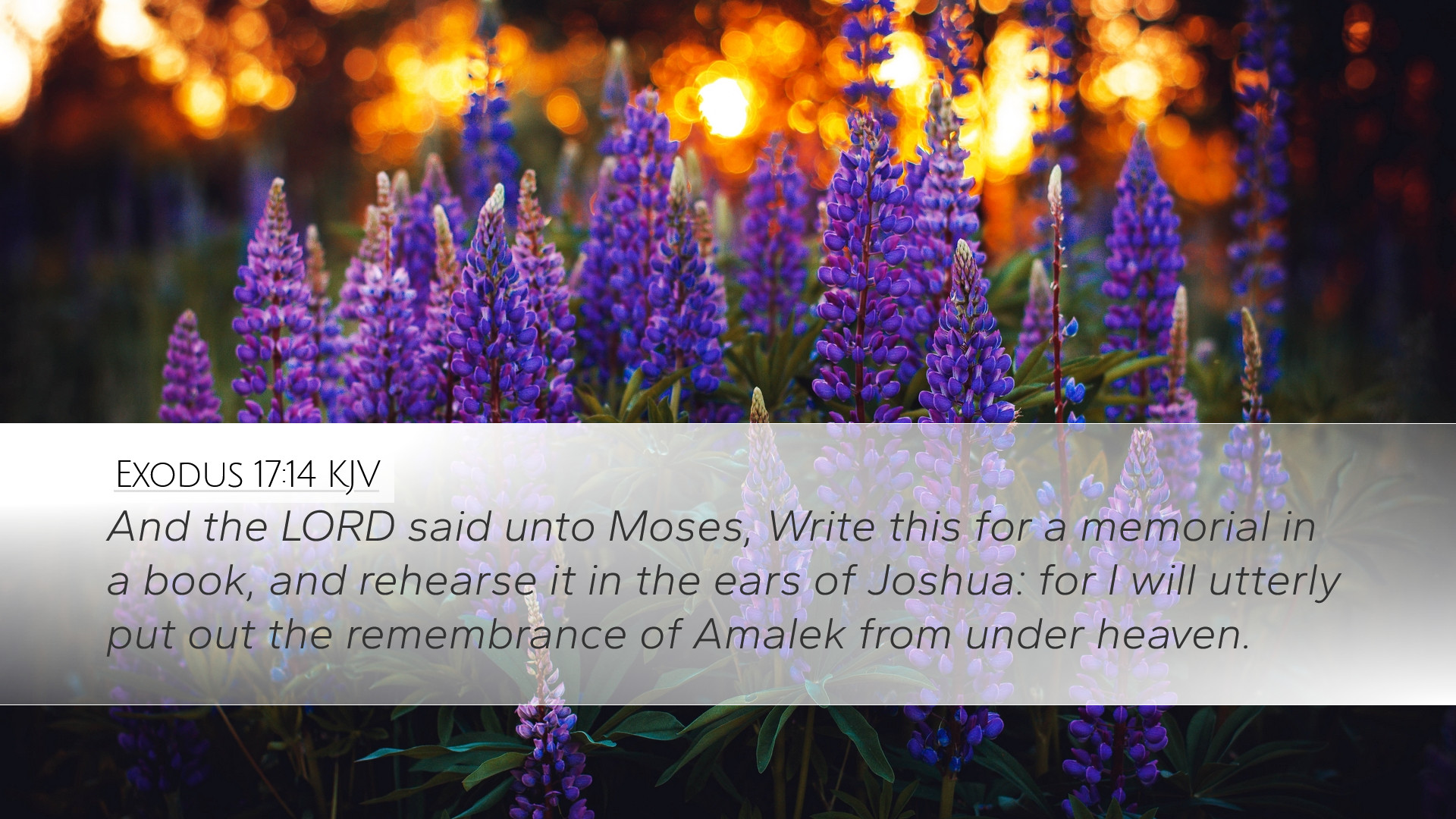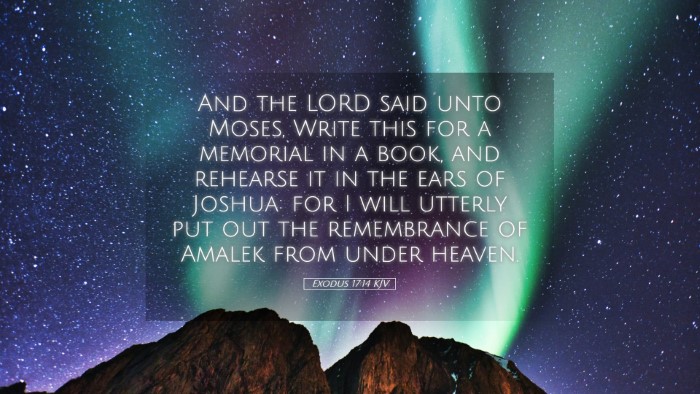Commentary on Exodus 17:14
Verse Context: Exodus 17:14 reads, “The LORD said to Moses, ‘Write this on a scroll as something to be remembered and make sure that Joshua hears it, because I will completely blot out the name of Amalek from under heaven.’” This significant moment occurs after Israel's victory over the Amalekites, illustrating God’s plan for remembrance and His promise of judgment.
Introduction
This verse marks a pivotal moment in the journey of the Israelites, emphasizing the importance of divine instruction and remembrance in the life of God’s people. It serves not only as a directive to Moses but also as a foundational teaching about God’s justice and mercy. The commentaries from Matthew Henry, Albert Barnes, and Adam Clarke enrich our understanding of this passage.
Divine Instruction to Moses
Moses receives a direct command from the Lord to write these events down, suggesting an emphasis on historical remembrance and the preservation of God's deeds among His people. This is a precursor to the writing of Scripture, indicating that God desires His actions to be recorded for future generations.
- Matthew Henry: Henry stresses the importance of this divine command, indicating that writing these events serves as a memorial for the Israelites. He posits that such documentation reinforces faith among believers by recalling God’s past faithfulness.
- Albert Barnes: Barnes notes that this action underscores the significance of recorded history, highlighting how remembrance can provoke gratitude and encourage faithfulness among God’s people.
- Adam Clarke: Clarke extends the discussion to the idea of preaching from written records, emphasizing that the written Word not only strengthens individual believers but also nourishes the community of faith.
The Role of Joshua
The directive to make sure Joshua hears this message indicates the importance of leadership and mentorship within Israel. Joshua, being appointed by Moses to lead the people, underscores God’s preparation for future battles and challenges.
- Matthew Henry: He suggests that this moment signifies a transfer of knowledge and responsibility, with Moses ensuring that Joshua is aware of God’s plans and purposes.
- Albert Barnes: Barnes interprets this as a way of establishing Joshua’s identity as a future leader, where knowledge of God’s promises and past actions will equip him for his upcoming role.
- Adam Clarke: Clarke mirrors these thoughts, emphasizing that Joshua’s readiness to receive these divine plans is crucial for the continuity of God's mission among His people.
The Judgment of Amalek
The text’s proclamation about blotting out the name of Amalek is profound, reflecting God’s righteous judgment against sin and opposition to His people. This judgment serves as a warning to all nations of the impending consequences of rebellion against God.
- Matthew Henry: Henry notes that Amalek’s aggression represents a broader spiritual battle against the people of God, and their ultimate defeat is assurance of God’s triumph over evil.
- Albert Barnes: He emphasizes the severity of divine judgment, suggesting that Amalek serves as a historical example of the fate that awaits those who oppose God’s purposes.
- Adam Clarke: Clarke elaborates on the prophetic significance of this judgment, indicating that it foreshadows the ultimate defeat of all adversaries of God's kingdom.
Theological Implications
This verse presents profound theological implications for understanding God's sovereignty, the nature of divine judgment, and the importance of remembrance. Each commentary raises essential theological reflections.
- Matthew Henry: Henry reflects on God's patience and mercy, juxtaposed against the certainty of His justice. He notes that while God shows patience, sin will not go unpunished.
- Albert Barnes: Barnes connects the text to New Testament themes, emphasizing that the eternal destruction of evil reflects the ultimate victory of Christ over sin and death.
- Adam Clarke: Clarke approaches the passage by discussing the implications of forgetting God’s deeds, warning believers against apathy that could lead to spiritual defeat.
Conclusion
The instructions given to Moses, the emphasis on Joshua, and the declaration of God’s judgment against Amalek converge to provide a rich tapestry of meaning in Exodus 17:14. These insights serve as both a historical record and a theological foundation for understanding God’s workings among His people. Pastors, theologians, and students of Scripture are encouraged to reflect on the significance of divine remembrance, the weight of leadership, and the nature of God’s justice as they engage with this powerful passage.


